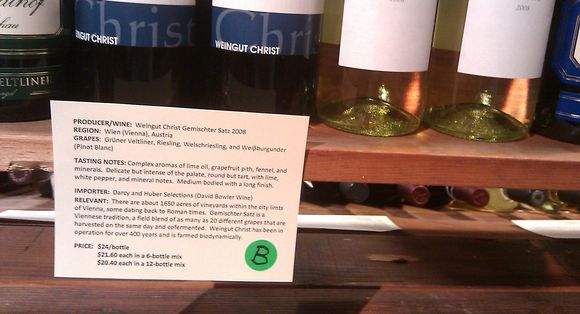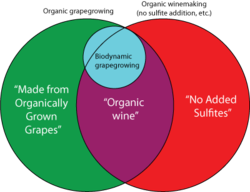
Back when I was first getting into wine, I was shopping at Red Feet Wine Market, an Ithaca boutique wine shop. I noticed that some of their shelftalkers had little stickers (seen above) with the letters "O", "S"or "B". Having lived in Ithaca for a bit, I soon gathered that "S" stood for "sustainable" and "O" stood for organic.
I had no idea what "B" stood for.
"Biodynamic," owner Dewi Rainey informed me. "It's like organic plus."
Intriguing.
She went on to explain that in addition to being 100% organic, grapes are farmed according to an astrological calendar and how racking and other winemaking processes were done according to phases of the moon.
Okay…
Years later, this conversation has stuck with me. Phases of the moon? Astrological signs? Do people really believe this stuff?
It turns out that people do. Lots of them. Even the hallowed Domaine de la Romanée-Conti has vineyards given over to biodynamic farming. Many in the wine community are enamored by biodynamic wines. The notion of a vineyard in balance with nature appeals to people.
Since the first wines were made, the consumption of wine has been linked to some kind of spiritual experience (to Catholics, during the Mass, wine is transubstantiated into the Blood of Christ!). Therefore, it's easy to see why the spiritual language that describes wine is ubiquitious (e.g., "the soul of a great wine", etc.) and why wine grown using spiritual or cosmic forces may seem appealing.
Not everyone is crazy about biodynamics, though.
Stuart Smith, winegrower and owner of Smith-Madrone Vineyards in the Napa Valley, recently started a blog called, flatly, "Biodynamics is a Hoax." In it, he provides critical readings of Steiner's lectures on Agriculture, in addition to pointed critiques of biodynamic farming practices in general. It's a highly recommended read if you are in to this sort of thing.
Organic Viticulture and Labeling
I'm not going to go into all the details on this, since there are plenty of resources out there on organic wines, but here is a brief synopsis of labeling standards for organic wine products. All claims of "organic" must be certified. The certifier in New York is NOFA-NY.
- 100% Organic: All organic ingredients, no added sulfites
- Organic: at least 95% Organic ingredients, no added sulfites
- Made from Organically Grown Grapes: at least 70% organic ingredients, sulfites allowed
- Biodynamic: Certified by Demeter USA or other biodynamic certification body (see below)
 For those more visually inclined, I've included a handy Venn diagram (at right) of this process. Biodynamic doesn't really have any legal standing as far as the Tax and Trade Bureau (TTB) is concerned, but Demeter USA owns the trademark "Biodynamic" in the U.S., so certification is required for its use.
For those more visually inclined, I've included a handy Venn diagram (at right) of this process. Biodynamic doesn't really have any legal standing as far as the Tax and Trade Bureau (TTB) is concerned, but Demeter USA owns the trademark "Biodynamic" in the U.S., so certification is required for its use.
"Organic Plus"
So what's the difference between organic farming and biodynamic farming? Biodynamic farms go through a similar certification process to organic farms. According to website of Demeter USA, the major certifying body for biodynamic agriculture in this country:
"Biodynamic® farming is free of synthetic pesticides and fertilizers in
the same manner as certified organic farming. In order to qualify for
Demeter Biodynamic® status a farm must first meet the same 3-year
transition requirement that NOP certified organic farming requires."
But there's more to it than simply satisfying organic standards. Biodynamic farming is a philosophy that treats a farm as one living organism. From the Demeter Biodynamic Trade Organization website (emphasis mine):
The Biodynamic method is distinguished from organic and sustainable farming methods by four key attributes:
- A Paradigm Shift in Thinking: The Biodynamic farmer thinks
in terms of forces and processes whereas organic and sustainable
agriculture farmers think in terms of substances.- The
Biodynamic Farmer Uses All Nine of the Biodynamic Preparations: The
preparations are made following very specific methods. They are
numbered, and are used in very small quantities to homeopathically
treat compost, soil and plants. They include #500 Horn Manure; #501
Horn Silica; #502 Yarrow; #503 Chamomile; #504 Stinging Nettles; #505
Oak Bark: #506 Dandelion Flowers; #507 Valerian; and #508 Horsetail.- Understanding
and Use of Earthly and Cosmic Rhythms/Cycles: The Biodynamic farmer is
attuned to the daily, monthly and seasonal rhythms of nature, for
example, the affects [sic] of the new and full moons on planting seeds and
plant growth- Creation of a Whole Farm Organism: The
Biodynamic farmer strives for this ideal, as described below. The farm
depends on a minimum of input nutrients from outside the farm and,
ideally, generates its own fertility through cover-cropping and the use
of manure from animals that live on the farm.
So, for Demeter certification, there are are a lot of vague requirements (e.g., think in terms of forces) and some specific ones (use all the biodynamic preparations). The language here is important.
A Scientific Approach to Biodynamics
My intent in this new series of posts is not to dwell on the spiritual aspects involved, but to examine concrete observable phenomena related to biodynamic practices. Posts will include content on the influence of the moon on grapes and wine, the contents of the biodynamic preparations 500-508, homeopathy, and biodynamic grapegrowing and winemaking methods.
I've read Steiner's lectures on Agriculture and Nicolas Joly's "Wine from Sky to Earth: Growing and Appreciating Biodynamic Wine" and so far I have found plenty of material to comment on.
The series will also include profiles of some New York wine producers committed to moving their farms toward organic and/or biodynamic viticulture, which is not an easy task in any of New York's growing regions.
My initial impression is that some of the techniques espoused by biodynamics may actually produce results in the vineyard, but likely not for the reasons that Steiner and others profess.
Are there any specific practices that you'd like to see put under the scientific lens? I welcome your comments and suggestions below.
